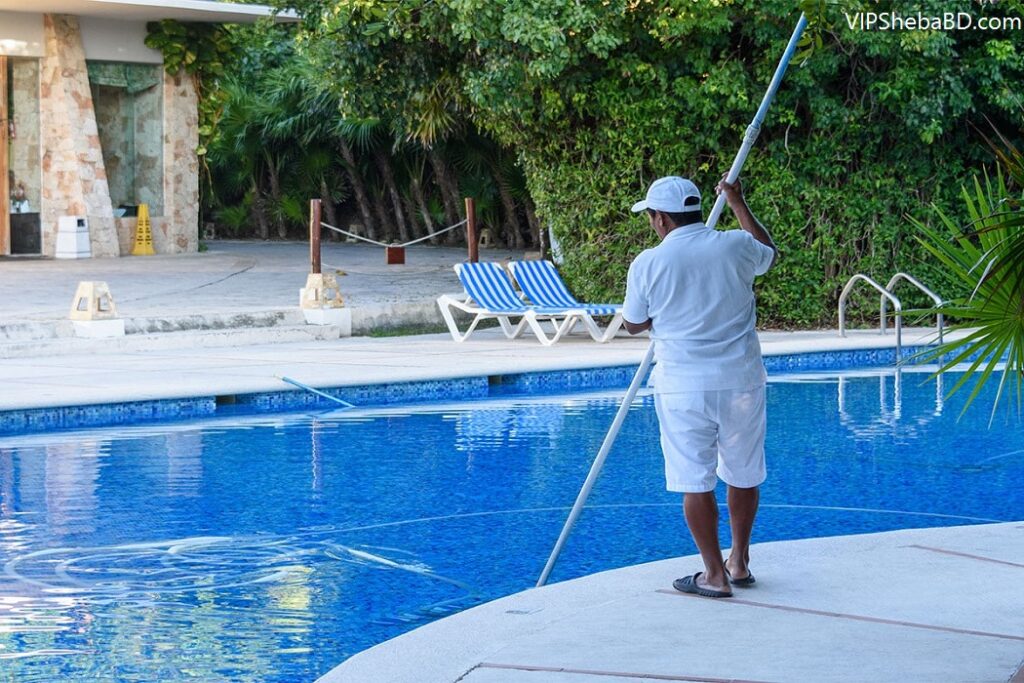As the world continues to grapple with environmental challenges, individuals and industries alike are seeking ways to minimize their ecological footprint. The swimming pool industry is no exception. While pools offer relaxation and recreation, they also consume resources and generate waste. However, by adopting eco-friendly practices, pool owners can enjoy crystal-clear waters while minimizing environmental impact. In this article, we explore sustainable approaches to pool service Tony’s Pool & Spa service, ensuring a greener swim for all.
Understanding the Environmental Impact of Pool Cleaning:
Before delving into sustainable practices, it’s essential to understand the environmental impact of traditional pool cleaning methods. Conventional pool maintenance often involves the use of harsh chemicals such as chlorine and algaecides, which can have detrimental effects on aquatic ecosystems when discharged into the environment. Additionally, excessive water consumption during backwashing and rinsing further strains water resources.
Furthermore, the energy-intensive nature of pool filtration and heating systems contributes to carbon emissions, exacerbating climate change. By recognizing these challenges, pool owners can take proactive steps to minimize their environmental footprint while maintaining a clean and safe swimming environment.
Sustainable Pool Cleaning Practices:
Embrace Natural Filtration Systems:
- Traditional pool filtration systems rely heavily on energy-intensive pumps and chemical treatments to maintain water quality. However, eco-conscious pool owners are increasingly turning to natural filtration alternatives such as biofilters and wetlands. These systems utilize natural processes and aquatic plants to filter impurities, reducing the need for chemical additives and energy consumption.
Opt for Eco-Friendly Chemical Alternatives:
- While chlorine has long been the go-to sanitizer for pools, there are now a variety of eco-friendly alternatives available. Products such as ozone generators, UV sterilizers, and mineral-based sanitizers offer effective disinfection without the harmful byproducts associated with chlorine. Additionally, enzyme-based cleaners can help break down organic matter and reduce the need for chemical shock treatments.
Minimize Water Waste:
- The thousand oaks tony’s pool spa service practices often result in significant water waste through backwashing and rinsing. By implementing water-saving techniques such as regular skimming, vacuuming, and using pool covers to minimize evaporation, owners can conserve water and reduce their ecological footprint. Furthermore, investing in water-efficient filtration systems and recirculation pumps can further minimize water consumption.
Harness Solar Power:
- Pool heating accounts for a significant portion of energy consumption in traditional pool systems. By harnessing the power of the sun through solar heating systems, owners can reduce reliance on fossil fuels and lower their carbon emissions. Solar panels can be installed on rooftops or ground-mounted near the pool area to capture sunlight and heat water efficiently, providing a sustainable and cost-effective heating solution.
Practice Responsible Chemical Management:
- Proper chemical management is essential for maintaining water quality and preventing algae growth. However, overuse or improper disposal of chemicals can harm aquatic ecosystems. By following recommended dosage guidelines, conducting regular water testing, and safely disposing of expired chemicals, owners can minimize environmental harm while ensuring a clean and safe swimming environment.
Invest in Energy-Efficient Equipment:
- Upgrading to energy-efficient pool equipment such as variable-speed pumps, LED lighting, and energy-efficient heaters can significantly reduce energy consumption and operating costs. Additionally, investing in automated control systems can optimize energy usage by scheduling filtration and heating cycles based on demand, further enhancing efficiency and sustainability.
Adopt Responsible Maintenance Practices:
- Regular maintenance is crucial for preserving water quality and extending the lifespan of pool equipment. By promptly repairing leaks, cleaning filters, and servicing equipment, owners can prevent unnecessary water loss and energy waste. Additionally, implementing proper stormwater management measures can prevent runoff pollution and protect nearby water bodies from contamination.
Benefits of Sustainable Pool Cleaning:
Embracing eco-friendly pool cleaning practices offers a host of benefits for both the environment and pool owners:
- Reduced Environmental Impact: By minimizing chemical usage, conserving water, and lowering energy consumption, sustainable pool cleaning practices help protect aquatic ecosystems and reduce carbon emissions.
- Cost Savings: While initial investments in eco-friendly equipment and technologies may require upfront costs, the long-term savings on energy and chemical expenses can outweigh these expenses, resulting in significant cost savings over time.
- Healthier Swimming Environment: Natural filtration systems and non-toxic sanitizers create a healthier swimming environment free from harmful chemical residues, promoting the well-being of swimmers and aquatic life alike.
- Enhanced Property Value: A sustainably maintained pool can enhance the aesthetic appeal and value of a property, attracting eco-conscious buyers and renters seeking environmentally friendly amenities.
Conclusion:
In conclusion, sustainability and pool cleaning are not mutually exclusive concepts. By adopting eco-friendly practices such as natural filtration, minimizing water waste, harnessing solar power, and investing in energy-efficient equipment, pool owners can enjoy a cleaner and greener swimming experience while minimizing their environmental footprint. By taking proactive steps to embrace sustainability, we can preserve the beauty of our planet for generations to come, one swim at a time.

